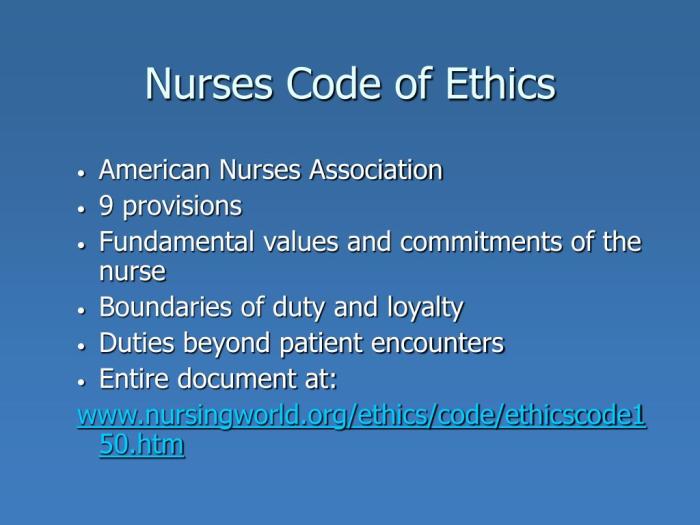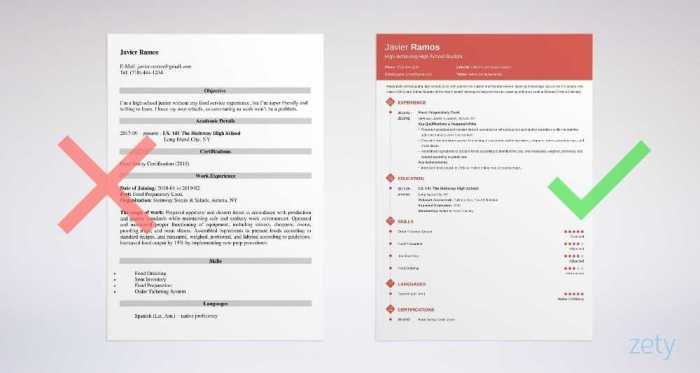The american nurses association code of ethics is legally binding – The American Nurses Association Code of Ethics is a cornerstone of the nursing profession, providing a legally binding framework for ethical decision-making. It guides nurses in upholding the highest standards of care and ensuring the well-being of their patients. This comprehensive guide explores the ethical principles, legal implications, scope, enforcement, and interpretation of the ANA Code of Ethics, offering valuable insights into its impact on nursing practice.
The ANA Code of Ethics serves as a compass for nurses, empowering them to navigate complex ethical dilemmas and make informed choices. It sets forth fundamental principles that govern the nurse-patient relationship, including autonomy, beneficence, non-maleficence, and justice. By adhering to these principles, nurses fulfill their ethical and legal obligations to their patients, colleagues, and the public.
1. Ethical Principles

The ANA Code of Ethics is based on four fundamental principles that guide nurses in their professional practice:
- Respect for the autonomy of the patient
- Beneficence (doing good)
- Non-maleficence (doing no harm)
- Justice (fair and equitable treatment)
These principles help nurses to make ethical decisions in complex situations and ensure that patient well-being is always prioritized.
Ethical Dilemmas and the Code
Nurses often face ethical dilemmas in their practice, such as:
- Deciding whether to respect a patient’s refusal of treatment
- Balancing patient confidentiality with the need to report suspected abuse
- Prioritizing care when resources are limited
The ANA Code of Ethics provides guidance to nurses in navigating these dilemmas by offering ethical principles and guidelines to support decision-making.
2. Legal Implications
The ANA Code of Ethics is not legally binding, but it does have legal implications for nurses:
- Professional Liability:Nurses who violate the code may be subject to disciplinary action from their professional organizations, such as suspension or revocation of their license.
- Civil Liability:Patients who suffer harm due to a nurse’s ethical breach may file a civil lawsuit against the nurse and the healthcare organization.
- Criminal Liability:In extreme cases, nurses who violate the code may be charged with criminal offenses, such as negligence or assault.
Case Studies
- In 2018, a nurse was convicted of criminal negligence after failing to report suspected child abuse, violating the ethical principle of non-maleficence.
- In 2021, a nurse lost their license after violating the ethical principle of autonomy by administering medication to a patient without their consent.
3. Scope and Limitations
The ANA Code of Ethics applies to all registered nurses in the United States, regardless of their specialty or practice setting.
However, the code does have limitations:
- Not All Ethical Issues:The code does not address all ethical issues that nurses may encounter in practice.
- Cultural Differences:The code may not always be applicable in all cultural contexts.
- Evolving Ethical Standards:Ethical standards change over time, and the code may not always reflect the most current thinking.
4. Enforcement and Interpretation: The American Nurses Association Code Of Ethics Is Legally Binding
The ANA Code of Ethics is enforced by professional organizations and licensing boards:
- Professional Organizations:Organizations such as the ANA and the National Council of State Boards of Nursing (NCSBN) have their own ethical codes and disciplinary procedures.
- Licensing Boards:State nursing boards have the authority to revoke or suspend the licenses of nurses who violate ethical standards.
Interpreting the Code, The american nurses association code of ethics is legally binding
Interpreting the ANA Code of Ethics in specific situations can be complex:
- Contextual Factors:Nurses must consider the context of the situation, such as the patient’s condition, the available resources, and the legal implications.
- Ethical Decision-Making Models:Models such as the Belmont Report and the Four Principles Approach can help nurses to analyze ethical dilemmas.
5. Comparison to Other Codes
The ANA Code of Ethics is similar to other ethical codes for healthcare professionals, such as:
- American Medical Association (AMA) Code of Medical Ethics
- National Association of Social Workers (NASW) Code of Ethics
However, there are some differences in the specific ethical principles and guidelines of each code:
- Patient Autonomy:The ANA Code places greater emphasis on patient autonomy than other codes.
- Beneficence and Non-maleficence:The AMA Code places more emphasis on beneficence (doing good), while the NASW Code places more emphasis on non-maleficence (doing no harm).
These variations can impact how healthcare professionals make ethical decisions in interprofessional settings.
Popular Questions
Is the ANA Code of Ethics legally binding on all nurses?
Yes, the ANA Code of Ethics is legally binding on all registered nurses in the United States.
What are the potential legal consequences for nurses who violate the ANA Code of Ethics?
Nurses who violate the ANA Code of Ethics may face disciplinary action from their licensing board, including suspension or revocation of their license.
Who is responsible for enforcing the ANA Code of Ethics?
The ANA Code of Ethics is enforced by state nursing boards and professional organizations.
